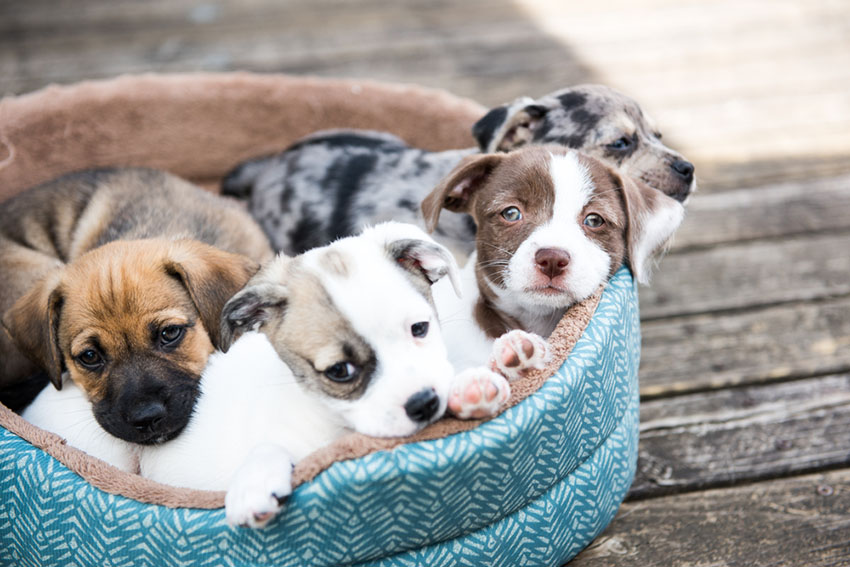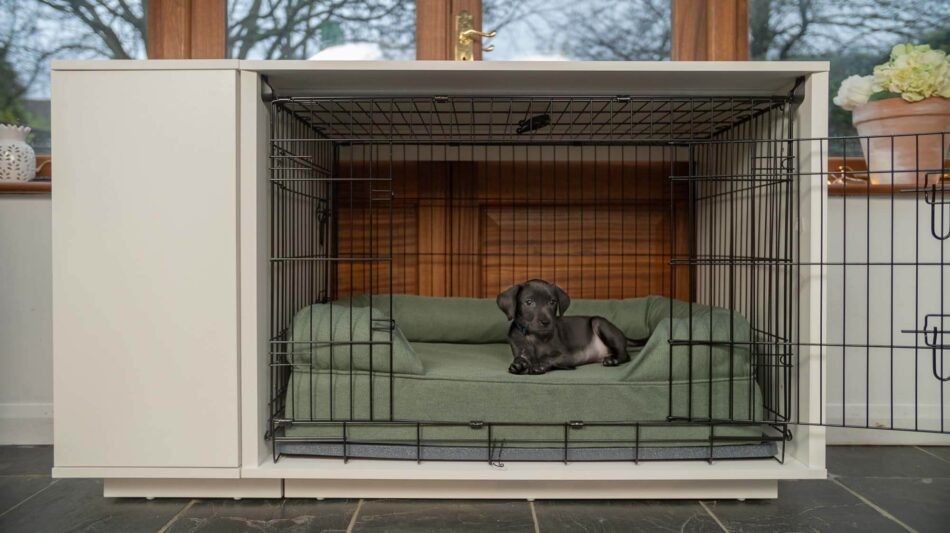How to Crate Train a Puppy
When a new pet joins the family one of the first things to work out is how to crate train a puppy. It’s fantastic when a puppy quickly learns that their new crate is a safe and comfortable little den. Teach your pup to enjoy his new dog crate by introducing him to it slowly and at his own pace. Your puppy needs to feel safe inside his crate. If he ever feels frightened or forced to rest in his crate he will always be reluctant to enter. Eventually, the idea is that you will be able to command your pet to go into his crate when you want him to calm down and rest after a long walk or just before bedtime.

Making your puppy comfy in their crate
Ensuring your puppy has a comfy dog crate is the first step in training them how to use it. With an inviting dog crate that contains a soft dog bed and comforting dog blanket, your pup is far more likely to feel relaxed in the space.
Whilst your puppy is bound to grow into a larger dog, it’s important to choose the right size dog crate. Having a crate that they fit perfectly will make sure they’re as comfy and settled as possible.
How to introduce your puppy to its crate
Introducing your puppy to crate training can be easy when you follow our steps below. Remember to take it slow and to be patient with your new addition.
Step one: tempt your puppy into the crate
The first step in crate training a puppy is to get them in the crate. Tempt your puppy into the crate with a tasty dog treat while offering lots of generous praise. If he doesn’t want to go in, pick him up and place him in and then give him a treat and lots of praise. If your puppy seems scared or agitated about crate training, talk to him in a positive yet calm voice and stroke him until he calms down. Only leave your puppy inside the crate for a couple of minutes. Then move back and call him out. When he comes to you, give him lots of praise again, but don’t give him a treat. You should only give your puppy treats when they’re inside their crate.
Step two: closing the crate door
Once the first step of crate training your puppy is done, and your pet is comfortable with going in and out of the crate. Without your puppy getting agitated or frightened, you can begin to close the door. Keep it closed for just a minute and stay in range so that your puppy can see you when crate training (If your puppy does get slightly overwhelmed, open the door, invite him out and then repeat step one a few more times). After the minute is up, open the door and invite your puppy back out again. Don’t forget, give him lots of praise but not a treat when he is outside again – right now you need him to associate the treat with the crate!
Step three: praise your puppy during crate training
Repeat step two while gradually increasing the time that your puppy is spending training in the crate. After the allotted time is up, always give your puppy plenty of praise when you open the door and invite him out. Repeating this process as part of your puppy crate training routine will have them ready to use it daily in no time!
How to train your puppy to sleep in their crate at night
Starting crate training your puppy straight away is the best way to get your dog settled in quickly. It is very important that you make his crate a comfortable and enjoyable place. The idea is that the crate should provide him with a ‘den’ where he can feel safe and secure. If your puppy enjoys his little den, he will want to use it on his own accord, which will make crate training so much easier.
Here are four easy steps that will help you crate train your puppy for nigh times
Step one: exercise your puppy
The first thing to do when training your puppy to sleep in their crate at night, is to give them lots of exercise. Play with him and tire him out, feel free to use fun dog toys, so that he uses up all of his excess energy. It is really important that you do this before you start crate training your puppy, otherwise your dog might be rather reluctant to rest inside his crate.
Step two: encourage a nap
After you have tired your puppy out, invite him into his crate with a treat and lots of praise. You do not have to close the door behind him if he is not entirely comfortable with the crate. Sit with him until he calms down, and then reward him. Hopefully your puppy will want a rest, and might even have a little nap. If he falls asleep, close the door behind him and supervise him until he wakes up. Usually a puppy will only have a short minute nap, but depending on how much exercise you have given him, he could rest for up to a couple of hours.
Step three: gradually increase puppy crate training time
Next time you crate train your puppy, invite them in for a rest, extend the time to about an hour, and keep extending it by 30 minutes each time. If your puppy wakes up before an hour, sit with him until he is calm. He is more than likely to fall straight back to sleep, providing that you gave him enough exercise before you started crate training. Again, you don’t have to close the door if your puppy is not comfortable enough yet. But if he falls asleep (and hopefully he will) then close the door and supervise him until he wakes up.
Step four: train your puppy overnight
As soon as your puppy is able to rest quietly for a few hours he should be ready to stay in the crate overnight without a problem. But remember, persistence and repetition are key. As long as you make crate training an enjoyable experience for your puppy, it will take no time at all for him to feel comfortable resting inside his little den.
Sometimes placing an old t-shirt of yours inside the crate will comfort your puppy. The smell of you will calm him down and help him sleep.
Omlet pet care
Making your new pet as comfortable in their new home is simple with Omlet. Our range of dog cooling mats and dog mattress toppers will help them settle into your home in no time.
This entry was posted in Dogs
